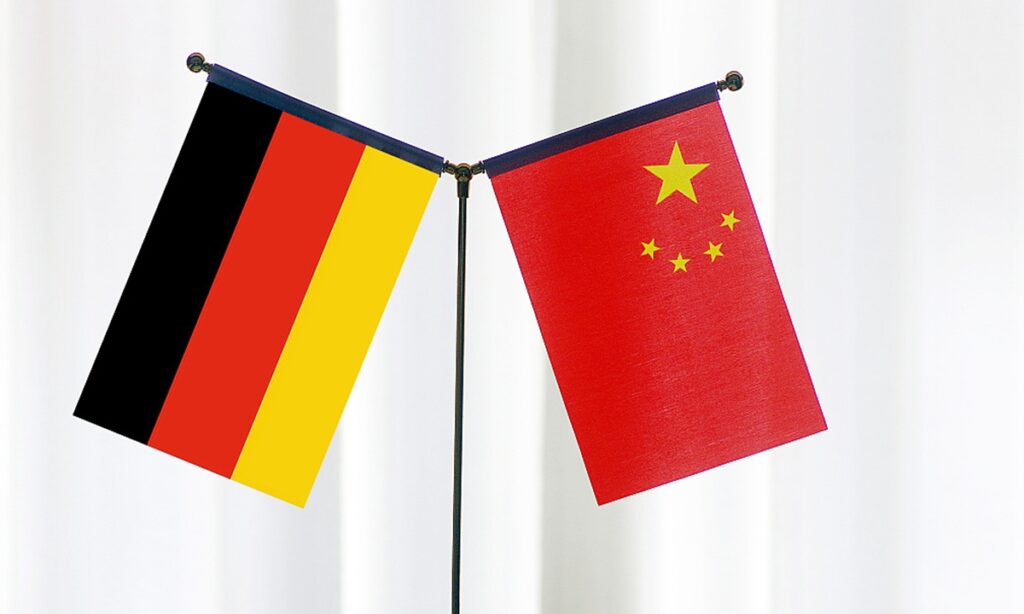Chinese President Xi Jinping met with German Chancellor Olaf Scholz at the Diaoyutai State Guesthouse in Beijing in the morning of April 16. The two sides not only had in-depth discussions on current China-Germany relations but also exchanged views on international and regional issues of mutual interest, reaching consensus on issues such as the Ukraine crisis and the Palestine-Israel conflict. As China and Germany are respectively the second and third largest economies in the world, the consolidation and development of their relations carries significance that goes beyond the bilateral scope, and has a major impact on the Eurasian continent and the entire world, Xi said, calling on the two countries to view and develop bilateral relations from a long-term and strategic perspective, and work together to inject greater stability and certainty into the world.
The meeting between the two leaders holds significant importance both bilaterally and globally. At the critical juncture of the 10th anniversary of the establishment of the all-round strategic partnership between China and Germany, the two countries vigorously enhanced strategic mutual trust, further solidifying and developing bilateral relations. Against the backdrop of escalating regional conflicts and hotspot issues, as well as the uncertainty of global recovery and the growing headwinds of trade protectionism, this meeting of the leaders of both countries has brought rare stability and confidence to the world. The scene of the two leaders taking a walk and chatting at the Diaoyutai State Guesthouse in the spring has quickly garnered attention and positive reviews from media outlets around the world. Even some US and European media outlets that were initially skeptical of Scholz’s visit have changed their tone accordingly, affirming the signal of continued cooperation conveyed by the leaders of China and Germany during the meeting.
As a strategically significant interaction between China and Germany, the dialogue between the leaders of the two countries has clarified the direction of China-Germany relations as well as the broader China-Europe relations at four levels. First, mutually beneficial cooperation between China and Germany is not a “risk,” but the guarantee for a stable bilateral relationship and an opportunity for the future. Second, both sides should promote the win-win features of their relations and enable each other to succeed. Third, the two sides should stay vigilant against the rise of protectionism, adopt an objective and dialectical view on the issue of capacity through a market and global perspective and based on the laws of economics, and devote more efforts to the discussion on cooperation. Fourth, the two countries share a lot in common on the issue of world multipolarity. A multipolar world is, in essence, one where countries with different civilizations, systems and paths respect each other and coexist in peace.
The above-mentioned ideas are also widely recognized and accepted at the social level in both countries. Scholz’s visit to China has followed a trend of starting low and ending high in domestic and European public opinion. Scholz’s visit to China was initially seen as a betrayal of Europe’s “de-risking” campaign. However, as Scholz’s visit unfolded, the German delegation and European public opinion saw and understood the real and comprehensive China, gaining a deeper understanding of the mutual benefit and win-win nature of the relationship. Scholz’s statement that “Chinese cars would be welcome on the market in Germany” was also warmly received in China for the same underlying reason. Under the conditions of a market economy, it is widely agreed that the best “protection” is to maintain competitiveness rather than increase trade barriers. This is believed to be inspiring for other countries as well.
The significance of the interaction between China and Germany for the world lies in highlighting how to promote mutual understanding and improve cognition through high-quality communication at a critical moment of global development and transformation, and when the relationship between the two sides is in a state of both opportunities and challenges. Some people have assumed that China and Germany cannot discuss or agree on sensitive issues. However, the experience of high-quality communication between China and Germany in the past allows both sides to engage in constructive dialogue. As two major countries, China and Germany being able to reach a common understanding in these areas will have implications beyond bilateral relations, having a benchmark significance for the entire world and impacting the maintenance and stability of global trade and supply chains in a practical way.
At the end of Scholz’s visit to China, both sides agreed to implement the results of the seventh China-Germany inter-governmental consultations, deepen cooperation in the fields of economy, trade, investment, and technology. The German chancellor and Chinese premier witnessed the signing of multiple bilateral cooperation agreements, including in the field of automated and connected driving. This undoubtedly reflects the practical level of the two countries in seeking consensus in the face of differences and exploring the feasibility of development through cooperation to manage competition. Facing the new political and economic situation in the world, it is believed that China-Germany relations have the ability to face reality and have the courage to face the future, and will surely be able to achieve long-term stability. As President Xi said, the more instability in the world, the greater the need for the two sides to strengthen the resilience and vitality of their relations, keep to the overall direction of cooperation and development in growing bilateral ties, and stick to the characterization of all-round strategic partnership.
(Global Times)




